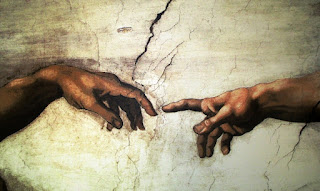 |
Photo of Michelangelo's Hand of God Painting by Markus 53 at
https://pixabay.com/photos/art-painting-wall-painting-285919/ |
This world history resource focuses on the European Renaissance
and Reoformation from 1300 to 1600 and includes quiz questions
and answers and video links to related topics.
I utilized World History: Patterns of Interaction (Holt McDougal)
for our world history textbook. It has multiple options for different
learning styles and covers a wide array of information.
This quiz accompanies Chapter 17: pages 468-503.
Directions for the quiz:
- Scroll down and click on the thumbnail to enlarge to full screen.
- Click on the graphic to advance to the next screen.
- Choose an answer for each question.
- Compare your answers with those provided.
If you are interested in a group and/or interactive version of this quiz,
log in to Kahoot! and search for Week 17 World History by Katrena.
Below are free videos to accompany chapter 17:
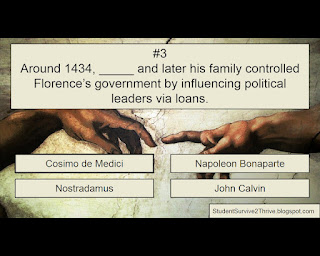 |
| The correct answer is Cosimo de Medici. |
Thanks for visiting my Student Survive 2 Thrive blog.
Navigate my blog easily through my site map, topics
tabs on the right, or via my search bar.
Here are a few of my articles you may also find helpful this week:
 |
| World History Week 17 European Renaissance & Reformation 1300-1600 |
 |
| Created by Katrena. All rights reserved. |
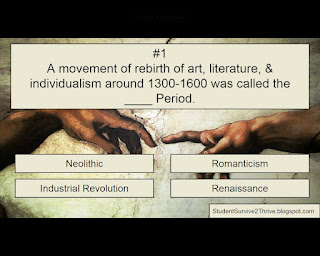 |
A movement of rebirth of art, literature, & individualism
around 1300-1600 was called the ____ Period.
Answer choices include: Neolithic, Romanticism, Industrial Revolution, Renaissance |
 |
| The correct answer is Renaissance. |
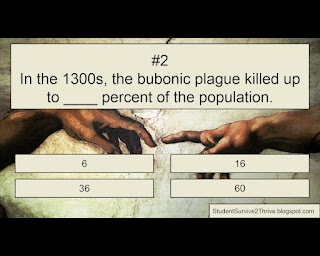 |
In the 1300s, the bubonic plague killed up to
____ percent of the population.
Answer choices include: 6, 16, 36, 60 |
 |
| The correct answer is 60. |
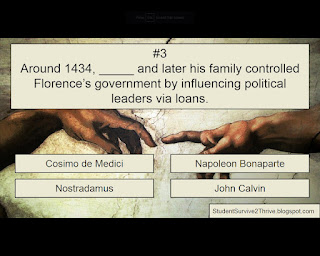 |
Around 1434, _____ and later his family controlled Florence’s
government by influencing political leaders via loans.
Answer choices include: Cosimo de Medici,
Napoleon Bonaparte, Nostradamus, John Calvin |
 |
During the Reniassance, the study of humanities became popular.
Which of the following include/s traditional humanity subjects?
Answer choices include:
physics, chemistry, biology;
algebra, statistics, calculus;
history, literature, philosophy;
all of these |
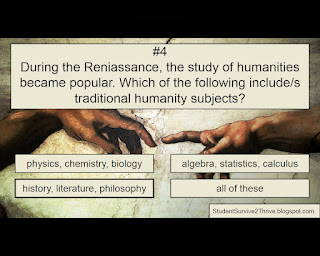 |
| The correct answer is history, literature, philosophy. |
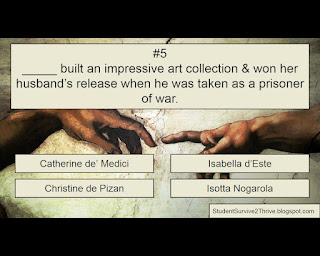 |
_____ built an impressive art collection & won her husband’s
release when he was taken as a prisoner of war.
Answer choices include:
Catherine de’ Medici, Isabella d’Este, Christine de Pizan, Isotta Nogarola |
 |
| The correct answer is Isabella d’Este. |
 |
Many Renaissance art pieces showed three dimensions on a flat surface called ____.
Answer choices include: collage, grisaille, pointillism, perspective |
 |
| The correct answer is perspective. |
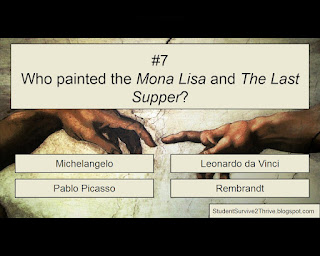 |
Who painted the Mona Lisa and The Last Supper?
Answer choices include: Michelangelo,
Leonardo da Vinci, Pablo Picasso, Rembrandt |
 |
| The correct answer is Leonardo da Vinci. |
 |
Departing from tradition, many Renaissance writers
such as Dante wrote in the ____, or their native language.
Answer choices include: vernacular, first person, future tense, novella |
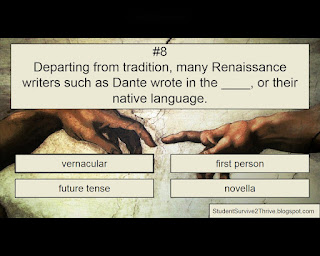 |
| The correct answer is vernacular. |
 |
Francesco Petrarch wrote 14-line poems called _____.
Answer choices include: lyrics, odes, sonnets, limericks |
 |
| The correct answer is sonnets. |
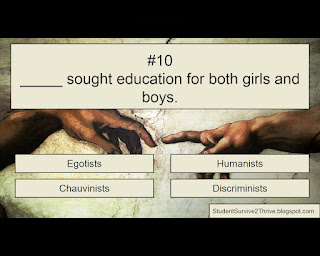 |
_____ sought education for both girls and boys.
Answer choices include: Egotists, Humanists, Chauvinists, Discriminists |
 |
| The correct answer is Humanists. |
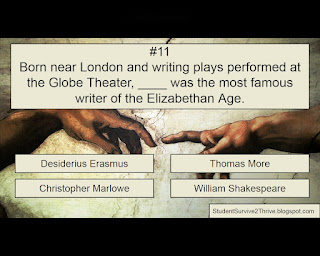 |
Born near London and writing plays performed at the Globe Theater,
____ was the most famous writer of the Elizabethan Age.
Answer choices include: Desiderius Erasmus, Thomas More,
Christopher Marlowe, William Shakespeare |
 |
| The correct answer is William Shakespeare. |
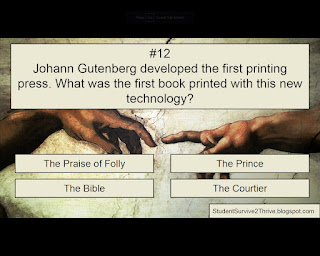 |
Johann Gutenberg developed the first printing press.
What was the first book printed with this new technology?
Answer choices include: The Praise of Folly,
The Prince, The Bible, The Courtier |
 |
| The correct answer is The Bible. |
 |
Other than walking, what was a popular means of travel in
& around London during the Renaissance Period?
Answer choices include: bus, trolley, boat, subway |
 |
| The correct answer is boat. |
 |
Which of the following teachings did Martin Luther
urge for the reformation of the Christian Church?
Answer choices include:
Good works are needed for salvation.
The pope and Church traditions are trusted authorities.
People do not need priests to interpret the Bible for them.
All of these were urged by Martin Luther. |
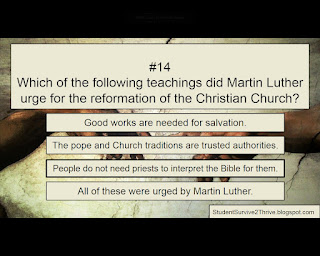 |
| The correct answer is: People do not need priests to interpret the Bible for them. |
 |
Numbering around 400 million worldwide, Christians
who belong to non-Catholic churches became known as _____.
Answer choices include: Protestants, Atheists, Jews, Agnostics |
 |
| The correct answer is Protestants. |
 |
____ decided each ruler should decide the religion
of his state, bringing about the Peace of Augsburg.
Answer choices include: Henry VIII, Charles V, Edward VI, Thomas More |
 |
| The correct answer is Charles V. |
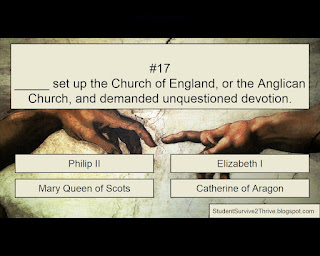 |
_____ set up the Church of England, or the Anglican Church,
and demanded unquestioned devotion.
Answer choices include: Philip II, Elizabeth I,
Mary Queen of Scots, Catherine of Aragon |
 |
| The correct answer is Elizabeth I. |
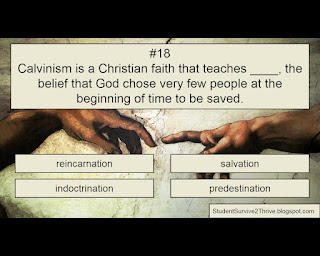 |
Calvinism is a Christian faith that teaches ____, the belief that
God chose very few people at the beginning of time to be saved.
Answer choices include: reincarnation, salvation, indoctrination, predestination |
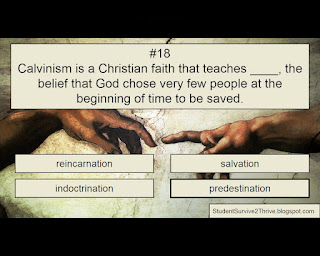 |
| The correct answer is predestination. |
 |
The Mennonites and Amish trace their
religious roots back to the _____.
Answer choices include: Anabaptists,
Lutherans, Presbyterians, Eastern Orthodox |
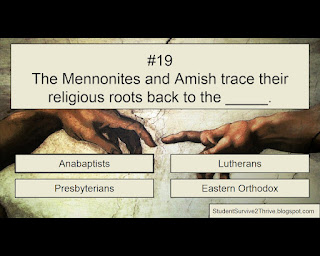 |
| The correct answer is Anabaptists. |
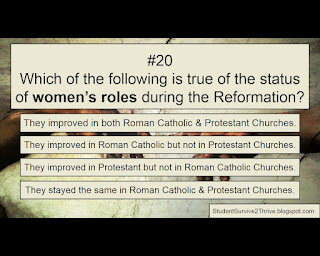 |
Which of the following is true of the status of women’s roles during the Reformation?
Answer choices include:
They improved in both Roman Catholic & Protestant Churches.
They improved in Roman Catholic but not in Protestant Churches.
They improved in Protestant but not in Roman Catholic Churches.
They stayed the same in Roman Catholic & Protestant Churches. |
 |
| The correct answer is: They stayed the same in Roman Catholic & Protestant Churches. |
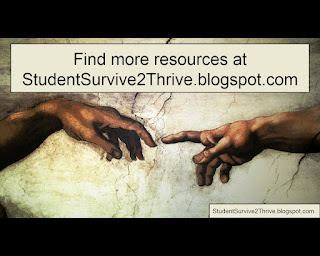 |
| Find more resources at StudentSurvive2Thrive.blogspot.com |












































No comments:
Post a Comment
Thanks for reading my article and sending your comment! Please note that I do not place links to other web sites on this blog.
Note: Only a member of this blog may post a comment.